Sorry for the extended delay, I got trapped in the whirligig that is Nanowrimo. Anyway we’d reached the half way point and about 8am and I’m afraid my tiredness was starting to get the better of me, so it’s increasingly incoherent from here on out folks...
34. God Is Jealous by Moira Buffini (Nahum)
“We will manage our own destruction
And of that
God is jealous.”
One of the things I loved about the intensity of the 24 hour event is that it gave me a sense of a thematic journey taking place across the Bible. These responses to the final books of the Old Testament were tinged with fury and loss and a lightening hint of hope at the very end. These themes were clear from this first piece in the set (though by this point concepts of firsts and lasts had become fairly ridiculous). It was something of an abstract piece, that has mainly left me with a striking impression of the lighting, slanting dramatically across the stage.
35. Habaccuc Dreams by Trevor Griffiths (Habakkuk) *
“It is you, isn’t it. This is what you do. Every time. Always have done, millennium after millennium. If you were appearing in Variety and your billing were written by Spike Milligan it would read GOD: the Sadistic Tease. Topped only by Milligan’s own bill-matter for himself: SPIKE MILLIGAN: The Performing Man. You still terrify me. Still. Long after belief died in my heart.”
This is one of the responses that has really stuck with me, I’ve found myself dwelling upon it over the last few weeks. Nigel Cooke shuffling on singing, a slightly haunting figure - dusty, shaved head and carrying his life upon his shoulders. Pausing before us and visited by God in a beam of light, we get to see his bitter diatribe at the being that sent him off to walk to world. Cooke is full of intensity - his voice rich, bleak and angry. And the entire piece manages to be charming and ugly at the same time - funny, painful and with clever use of repetition. Really wonderful.
36. In The Night, A Promise by Helen Edmundson (Zephaniah)
“The trees, I will fell,
And bring down all the fences and the gates.
And every flower and shrub I will unplant,
And leave the fruit to rot upon the grass.
It will become a feeding ground for foxes.
This place of sin.
This blasphemy.”
It felt like there was something of a theme emerging throughout the 24 hours (alongside the frequent foot fetishism) of women, and mothers in particular, transgressing. This was probably the clearest example and the most chilling. Both the imagery of the stage (the threat is directed to a camera set up in a childs bedroom) and the imagery in the text marries a sense of beauty and horror.
37. It Is Having Fallen Out Of Grace by Suheir Hammad (Haggai)
“there is a room of solitude required to hear god’s voices echo and reverb in one’s head. this room becomes a mansion becomes a prison becomes a bunker from all other voices, including reason, also sense. compassion. such fine difference in tenor between god’s voices and those of the opposite. how loud the din in this head, how rare the clarity.”
This is the point where I have to apologise - blame it on sleep deprivation, blame it on this being a really long section, blame it on my fairly apalling memory - but I have no memory of this piece. Out of sixty-six, I’ve forgotten one (which as it has turned out is ridiculously annoying). I’ve looked at pictures and read the text and still nothing... Though I really wouldn’t put that down to quality by any standards.
38. The End Of The Alphabet by Elinor Cook (Zechariah) *
“ALLIE: Do you think it’s still night?
Or is it morning now?
ZACH: Morning.
I think it’s morning.
ALLIE: Is that good or bad?
ZACH: It’s good.
It will start to get light soon
That’s good.”
Another piece I absolutely loved - which managed to be both an epic tale of post-apocalyptic survival and a deeply personal scene between a couple set in their bathroom. In fact the set consisted solely of a toilet, which Amanda Hale spent much of the scene gripping like a lifeline in her character’s fevered state. The isolation of that one piece of bathroom furniture and the limited use of lighting managed to make the scene very intimate, whilst also truly giving the feeling that the world could have ended outside (though again, that could have been our own separation from the outside world for 12+ hours seeping in - the piece fitted the mood of the event excellently). The focus on storytelling was one that greatly appealed to me and has echoed with me since, though I think what made it truly splendid was the natural rhythm of the script and the charmingly real relationship that Hale and Nicholas Burns created. There was also a lovely shared moment of audience and actors corpsing at the exchange quoted above, a definite piece of art mimicking life.
39. When You Left I Thought I’d Die But Now I’m Fine by Molly Naylor (Malachi)
“He tells me that what frustrates him is that critics never give you permission to fail and that’s what you need, in order to take risks. Because without risk how can artforms progress and evolve.”
-------
“People are afraid of packing. It’s one of those things we are taught to feel sad about. Nostalgic. For a second the weight of it all gets to me. But I shake it off. It’s just packing. And the sun pouring in through the windows.”
-------
“I run past the shop front with the broken window, past the borded-up takeaway, past the new Caffe Nero and both Greggs bakers. Down the alley next to the card shop and I’m soaking now. But I don’t care. Because suddenly it’s one of those days where I am in love with the world, and I am sorry for nothing, and don’t need to smoke cigarettes.”
A triptych of scenes provided the final contribution for the first half of part 5 which shared some small in-world links, but benefited more from a greater sense of thematic coherance - exploring the idea of feeling like the world has both ended and begun - destruction and renewal. The separate stories also shared mixed feelings of loneliness, seclusion, reaching out for contact - of solitude, self and family - and belief as an antidote for cynicism and equally lack of faith. It was an interesting mixture, with all three performers creating vivid snapshots into the characters lives - though Shannon Tarbet, who had impressed so much in Mogadishu, again stole the show (she is eerily like my own teenage niece). My enjoyment, however, suffered a little from the feeling that the entire half was never ending. Though I completely understand the desire to place the break between the Old and New Testament, it left us with a longer string of plays than we were used to and it was a problem exacerbated by the three very separate performances - each actor left the stage before they were replaced as the next section started - a bit of a Lord of the Rings style fake ending syndrome. Personally I would have had the stories more intermingled, moving from one to the other and back again (like the superb Cloud Atlas perhaps) and at the least would have liked the three characters to be on stage throughout, letting the audience know that there was more to come.
BREAK
40. A Nobody by Laura Dockrill (The Gospel According to St Matthew)
“Your coat pockets filled with rocks
Too heavy to wander
In a sadness that wallows
And turns the hills to sand
And you are sinking
And you are the bluest you have ever felt; so blue you think you are dying
And just at the last moment - even a thief managed to steal your heart.
That is how kind you are.”
Kicking off the New Testament, Dockrill provided a fragmenting, twisty piece of poetry - beautiful but dense. Alex Beckett and James Grieve did an absolutely magical job of bringing sense to it. They made it entirely compelling, with a beautiful rhyme, rhythm and balance to the words provided by Beckett’s welsh wizard of a prophet. Plus I couldn’t help but be enchanted by the falling paper and fire.
41. Capernaum by Steve Waters (The Gospel According to St Mark)
"PETER: You never saw him yourself did you? [MARK shakes his head.] Oh, there was such... ferocity - in those eyes - but the hands were always dry, cold even, but boy, you flinched at, his gaze, even when it was full of love there was such a fury in it...”
Whilst, as I’ve admitted earlier, my knowledge of the Bible is patchy at best - I am actually overly well informed about how it was written, having studied a module on the subject as part of my archaeology degree. So this piece, a fictional account of Mark piecing together his gospel, particularly appealed to me with it’s look at the difficulties of memory, creating history, authorial intent, the desire to edit the truth, what truth even means, and that the Bible is by it’s nature fallible. I thought it did an excellent job at examining a range of quite difficult ideas. I also really loved the version of Jesus it presented. Throughout these explorations of the New Testament, Jesus seemed more noticeable to me in his absence rather than presence, the responses are directed at his followers rather than him. Capernaum is one of the few where even though he doesn’t appear he lives vibrantly in its words - burning with passion, love, compassion and anger that drains and destroys those around him. It’s an incredible, powerful portrayal. In fact, my only complaint is a minor one, that I didn’t quite get that this was supposed to be set in a prison of sorts, but that certainly didn’t detract from my enjoyment.
42. Do Unto Others by Billy Bragg (The Gospel According to St Luke) *
“So just lift up your eyes
Don’t pass by on the other side
Don’t be bound by what you think others may do
A little bit of faith
That’s all it really takes
Do unto others as you would have them do to you.”
Both A Nobody and Capernaum could easily have been my favourite of this section, if it hadn’t been for how utterly magical Do Unto Others was. Thinking about it still gives me chills and it easily wins my favourite moment of the event. As Billy Bragg came on to the stage, clutching a guitar with the sticker slogan ‘This Machine Kills Time” - the shutters along either wall were thrown open and the rising sun streamed through, lighting the auditorium. After the long night, it was joyous seeing the sun return and to accompany it Bragg produced this beautiful, simple and very honest song. It was a wonderful moment.
43. Lazarus by Rowan Williams (The Gospel According to St John)
“When I was little and I heard thunderstorms I used to think it was like the noise of someone moving big empty wooden boxes around upstairs, and all these heavy things falling over. That’s what it reminded me of, heavy stuff falling over in an empty room somewhere. The Word was with God and the Word was God. No idea what it meant. Only the noise of it, big hard boxes falling over slowly on a wood floor.”
I must admit I was slightly sceptical to hear that the Archbishop of Canterbury would be providing a response though I’d be hard pressed to explain why given his credentials. Although it got a little lost in the middle (though equally that may have been down to my own tiredness), I thought this was a great piece. With some excellent descriptive sections full of beautiful writing and I found it a fascinating meditation on the Lazarus story. Plus there was genuine power and grief in the writing, excellently captured by the performers, with Helen Schlesinger’s fury and passion particularly standing out for me. Though as much as I enjoyed it, I suspect I wasn’t the only one relieved to hear a resounding holler of “Breakfast!” joyfully ringing out at the end.
BREAK FOR BREAKFAST
Part 6
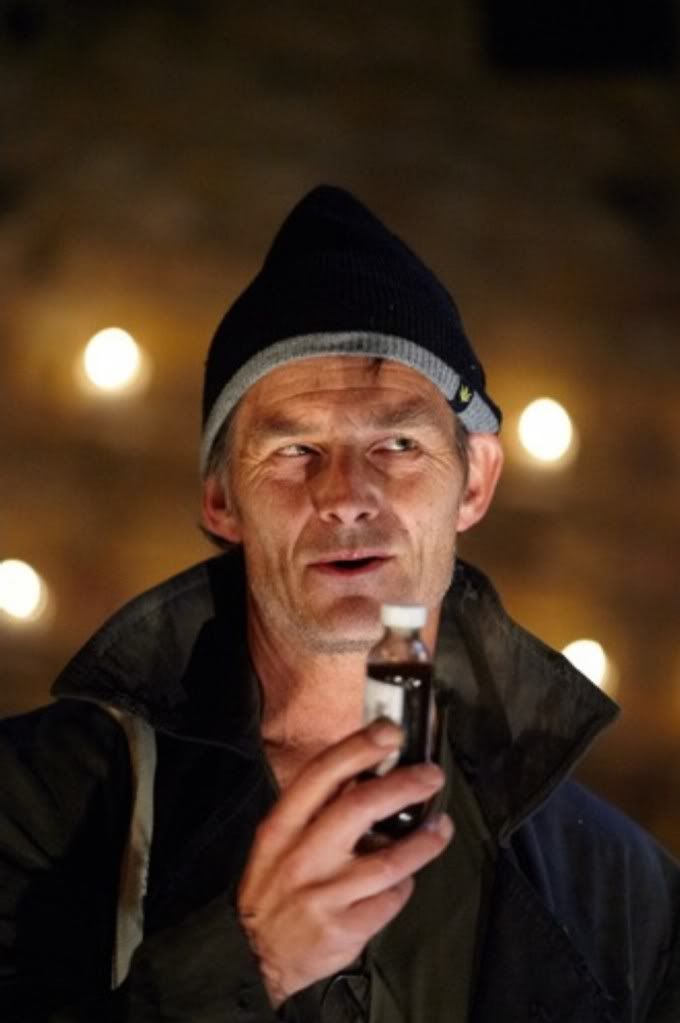
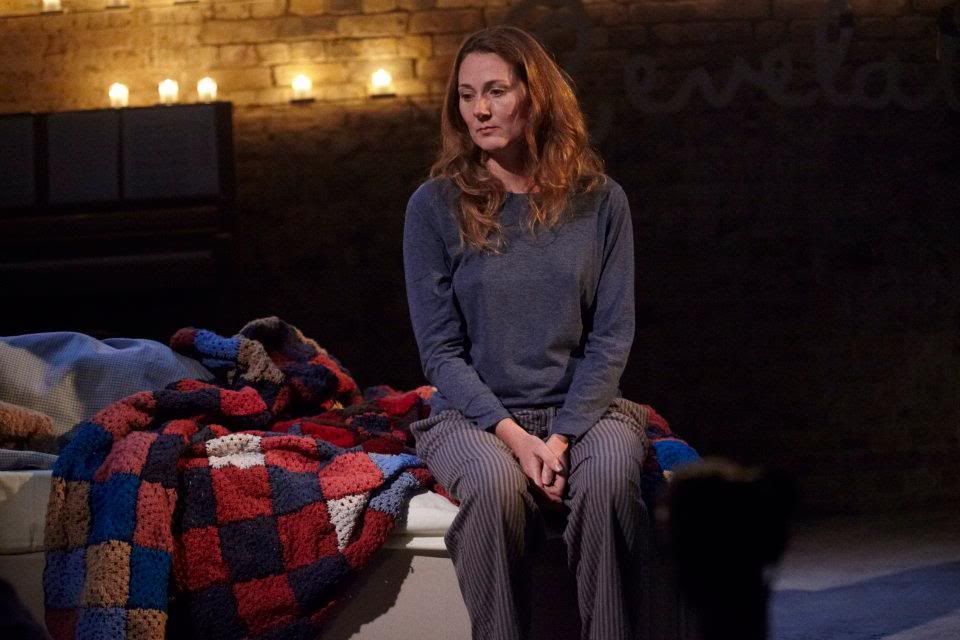
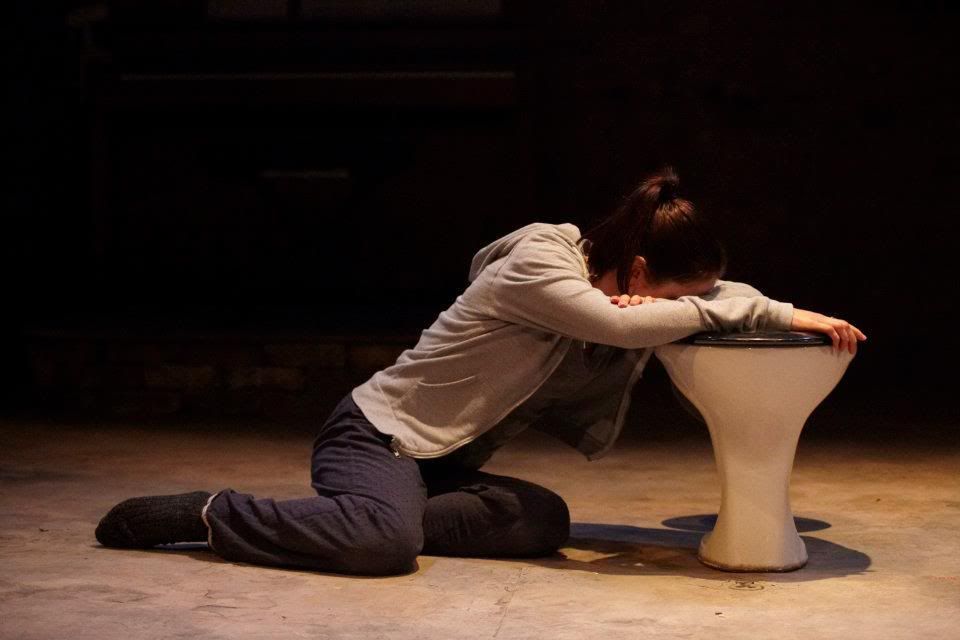
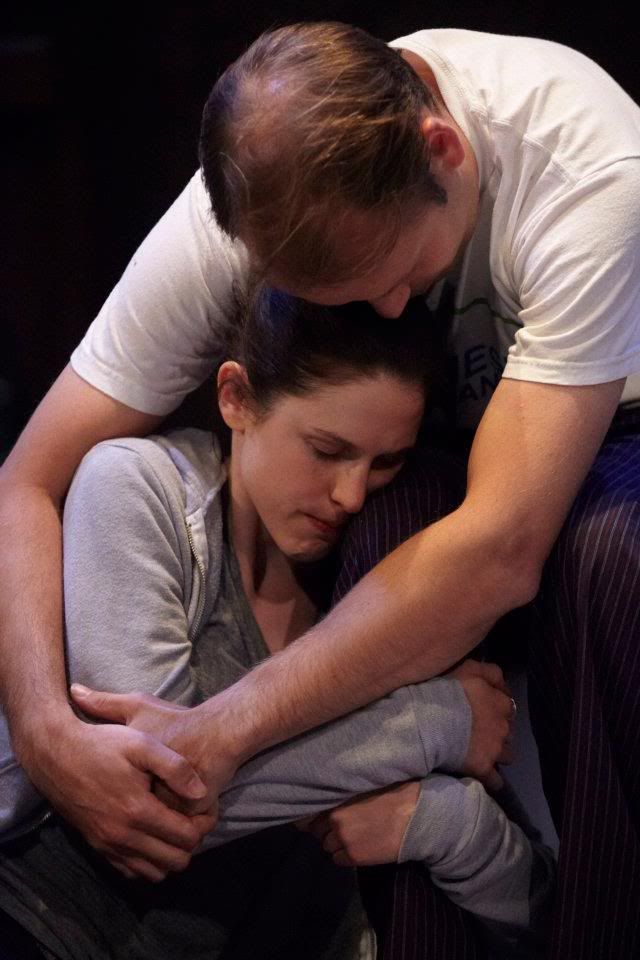
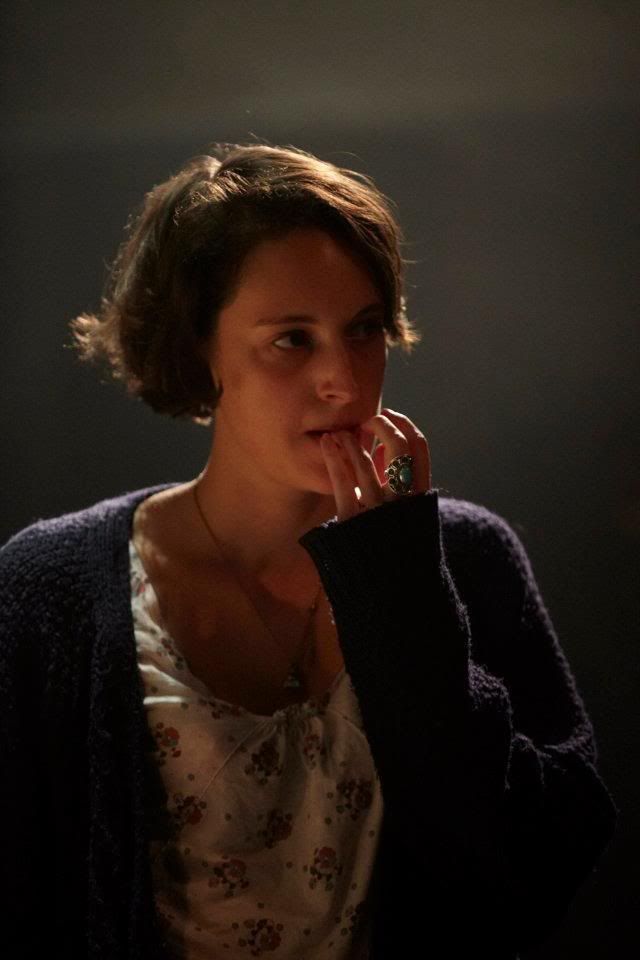
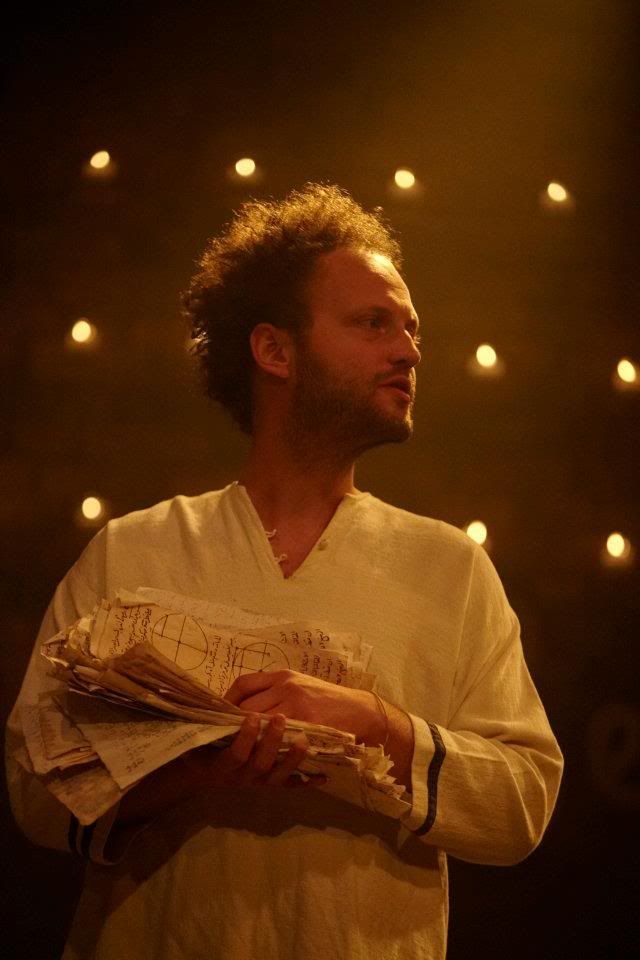
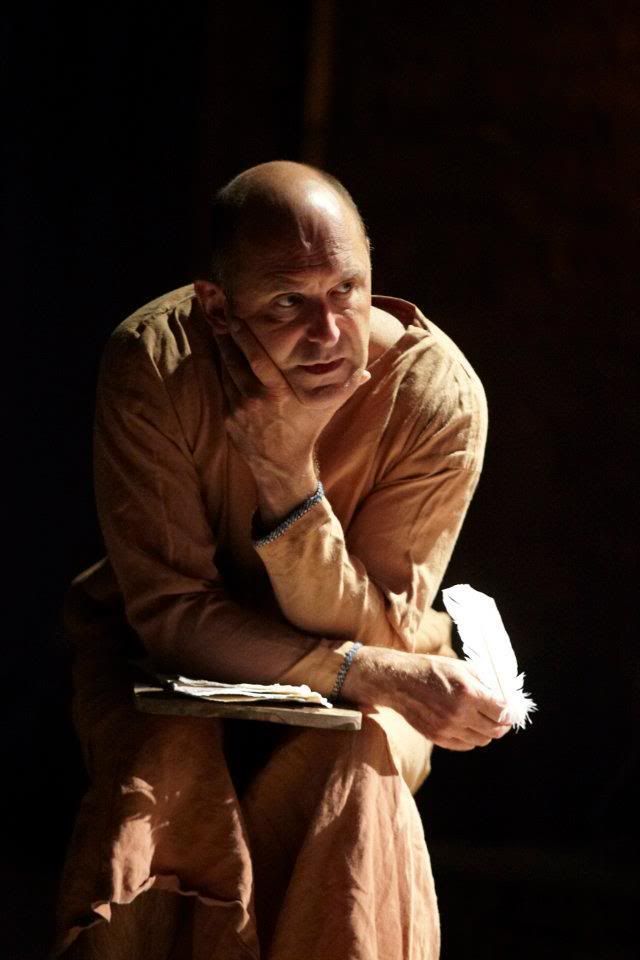
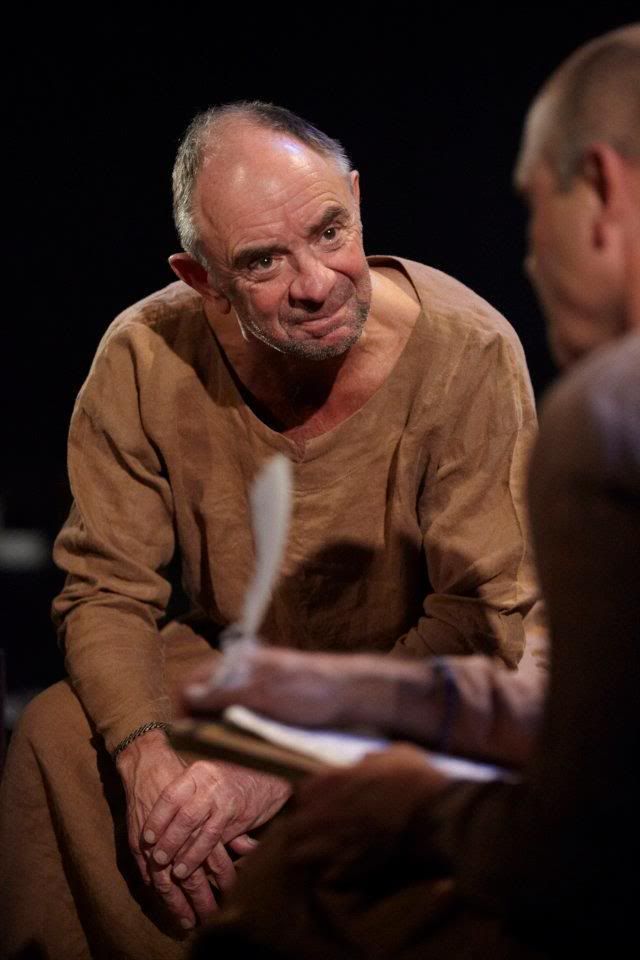
No comments:
Post a Comment